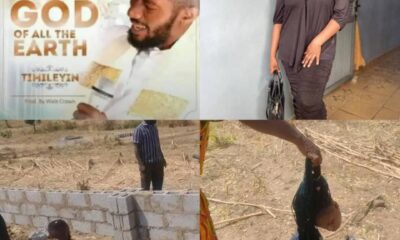Business
Nigeria’s Debt Per Capita To Surge As KPMG Calls For Borrowing Guidelines

According to KPMG’s recent Macroeconomic Snapshot, Nigeria’s per capita debt, which was N217,138 in 2022, is projected to reach N365,258 by the conclusion of 2023.
KPMG also highlighted that Nigeria’s debt service to actual revenue ratio, which has consistently exceeded 50 percent since 2017, was recorded at 81 percent in 2022.
It revealed that Nigeria’s debt service to revenue ratio of 81 percent at the close of 2022 was significantly higher than the average ratio of 22.5 percent observed among low-income nations.
“This is however unlikely being a transition year with the outgoing administration winding done and a new one starting which would require time to set up and settle before new policies can be introduced and work,” KPMG said.
KPMG stated that the new administration might even be compelled to borrow even more to run its government and stimulate much-needed growth in physical and social capital.
“To borrow more might need to widen the various legal and self-imposed restraints and buffers relating to deficit financing,” it said.
KPMG emphasized the importance of Nigeria establishing well-thought-out guidelines and frameworks for borrowing in order to avoid defaulting on loan terms, which could potentially harm the country’s credit rating and undermine confidence in borrowing money.
KPMG further emphasized the need for the Nigerian government to prioritize sustainable debt management and prioritize investments that generate long-term economic returns.
Additionally, KPMG pointed out that despite the intended short-term nature of Ways & Means advances, which are meant to fund delayed expected government cash receipts, they have been utilized over the past eight years in Nigeria to bridge the gap caused by unrealistic revenue projections.
The amount of Ways & Means advances rose significantly from N0.6 trillion in 2015 to N22.7 trillion by the conclusion of 2022.
The Senate had recently granted approval for the securitization of N22.7 trillion in Ways and Means advances that were provided to the government by the Central Bank of Nigeria (CBN).
Ways and Means loans serve as a mechanism for the government to borrow funds from the CBN on a short-term basis to address emergency financing needs and support the budget.
With Senate approval, these loans from the CBN, once assented to by the president, can now be converted to a type of security such as bonds that can be traded in the capital market,” KPMG said.
It stated that the securitisation of the CBN ways and means, as approved by the Senate, provides for the issuing of debt instruments with a 3-year moratorium on the principal, a 40-year term, and an annual interest rate of 9 percent per annum.
“The immediate impact of this is that Nigeria’s debt which hit N46.3 trillion by the end of 2022 will immediately rise to about N70 trillion,” KPMG said.
“This is representing 35 percent of 2022 nominal GDP which is close to the government’s own self-imposed target of 40 percent.
“However, with the N8.8 trillion expected new borrowings from both domestic and external means in the 2023 States and Federal budgets, the total debt stock will likely stand at about N77.8 trillion by the end of 2023.”
KPMG highlighted that the aforementioned securitization of Ways and Means advances does not take into account the potential for additional borrowings that may arise from incoming administrations at the State and Federal levels, which are not yet reflected in the 2023 budgets.
Business
Savannah Energy Provides Unaudited FY 2024 Trading Updates

Savannah Energy has shared a trading update on its Nigerian operations and other markets in Africa, including up-to-date cash collections in its Nigerian business.
According to the update, made available on Thursday in Lagos, its gross production in Nigeria averaged 23.1 Kboepd for FY 2024, broadly in line with the prior year’s 23.6 Kboepd, of which 88% was gas (FY 2023: 91%).
On the update, CEO of Savannah Energy, Andrew Knott, said, “I am pleased to provide a FY trading update which demonstrates the continued progress we have made in 2024, a year which saw the highest level of cash collections ever recorded by our Nigerian business. 2025 is expected to be an exciting year for our Company: we have a large planned operational programme in Nigeria which is anticipated to enhance both our oil and gas production levels and capacity; we intend to progress our R3 East oil development project in Niger; we continue to pursue key acquisitions in the upstream oil and gas space; and we continue to seek to build our power business.
“Fundamentally, Savannah remains unequivocally an “AND” company, seeking to deliver strong performance both for the short AND long term across multiple fronts, and pursuing growth opportunities in both the hydrocarbon AND power sectors.”
The update It also shows that it generated a Total Income of US$393.6 million in 2024, compared to FY 2023’s US$289.8 million. This consists of Total Revenues of US$258.7 million and Other operating income of US$134.9 million.
The report also shows that Savannah’s FY 2024 Total Revenues were ahead of the previously issued financial guidance of greater than US$245 million, while FY 2024 financial guidance is reiterated for Operating expenses plus administrative expenses at ‘up to US$75 million’. The company expects its FY 2024 capital expenditure to come in lower than planned (previously guided at ‘up to US$50 million’) due to the phasing of spend.
ALSO READ: CSR: Dangote Awards Scholarships To 473 Students
According to the update, Savannah’s cash collections in 2024 amounted to US$248.5 million, a slight increase from the US$206 million it received in 2023. The report further shows that its cash balances as at 31 December 2024 stood at US$32.6 million, compared to the 31 December 2023 figure of US$107.0 million.
The report shows that the company’s midstream subsidiary, Accugas Limited, had as at 31 December 2024 drawn down on its NGN332 billion of the NGN Transitional Facility, with the resulting funds being converted to US$, which, along with cash held, was used to partially prepay the existing Accugas US$ Facility, leaving a balance as at 31 December 2024 of approximately US$212.3 million.
The report also provided new updates on Accugas’ US$45 million Uquo Central Processing Facility (“Uquo CPF”) compression project in Nigeria, noting that its commissioning which will enable the expansion of gas production in the medium term is well underway.
The report highlighted the progress being made in the procurement process of long lead equipment in Nigeria for a potential two-well drilling campaign on the Uquo Field in H2 2025, with an additional gas development well expected to add up to 80 MMscfpd of supplemental production capacity and a potential exploration well targeting an Unrisked Gross gas initially in place (“GIIP”) of 154 Bscf (25.7 MMboe) of incremental gas resources.
The update shows that progress is also being made in the planned Savannah acquisition of Sinopec International Petroleum Exploration and Production Company Nigeria Limited, whose principal asset is a 49% non-operated interest in the Stubb Creek oil and gas field (“Stubb Creek”), with regulatory approval and completion being targeted in Q1 2025. Following the completion of the acquisition, Savannah intends to commence an expansion programme which is anticipated to increase Stubb Creek gross production from an average of 2.7 Kbopd in 2024 to approximately 4.7 Kbopd.
In Niger, Savannah continues to seek to progress its 35 MMstb (Gross 2C Resources) R3 East oil development in South-East Niger, while it continues to push for a potential alternative transaction structure to acquire a material stake in producing oil and gas assets in South Sudan as previously announced on 20 December 2024.
On the renewable energy front, the update shows that Savannah has up to 696 MW of renewable energy projects currently in motion, including the up to 250 MW Parc Eolien de la Tarka wind farm project in Niger and the up to 95 MW Bini a Warak hybrid hydroelectric and solar project in Cameroon. A firm believer in Africa’s transition to renewable energy, Savannah continues to target a portfolio of up to 2 GW+ of power projects in motion by the end of 2026.
Business
Nigeria Can Achieve 5.5% GDP Growth – NESG
The Nigerian Economic Summit Group (NESG) has projected that the country has the potential to achieve a 5.5% growth in Gross Domestic Product (GDP) if critical policy reforms are sustained.
This was disclosed on Thursday during the launch of the NESG’s 2025 Macroeconomic Outlook report.
Speaking at the event, the Chief Economist and Director of Research & Development at NESG, Dr. Olusegun Omisakin, highlighted the need for more efficient policy implementation to unlock Nigeria’s economic potential.
READ MORE: Davido Is Richer Than His Billionaire Father – Ibrahim Chatta Claims
“We believe at the optimal level, if we embark on more efficient policy reforms, the Nigerian economy has the potential, the GDP to end up at 5.5 per cent, and we believe that this is achievable,” Omisakin stated.
More to follow……….
Business
CBN Approves Release Of Nigerian FX Code
The Central Bank of Nigeria (CBN) has announced the release of the Nigerian Foreign Exchange (FX) Code, a set of guidelines designed to promote ethical conduct among authorized dealers in the country’s FX market.
In a statement, the apex bank disclosed that the official launch of the Code would take place on Tuesday, January 28, 2025, at the CBN Head Office Auditorium in Abuja.
READ MORE: Dangote Denies Culpability In Pumping Up Petrol Price
“The Central Bank of Nigeria has approved the release of the Nigerian Foreign Exchange (FX) Code as a guideline to the banking industry to promote the ethical conduct of authorised dealers in the Nigerian Foreign Exchange Market,” the statement read.
The introduction of the FX Code is expected to enhance transparency, accountability, and professionalism within Nigeria’s foreign exchange ecosystem, aligning it with global best practices.
The event is anticipated to attract key stakeholders in the financial and banking sectors, as well as representatives from authorized FX-dealing institutions across the country.






















